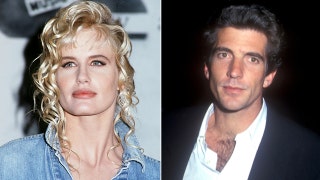Fox News Flash top entertainment headlines for March 21
Fox News Flash top entertainment and celebrity headlines are here. Check out what's clicking today in entertainment.
Justin Bieber is facing some backlash after using the words and speeches of Martin Luther King Jr. in his latest album.
Bieber released his sixth studio album titled "Justice" on Friday and as eager fans began listening to the album over the weekend, many were perplexed to hear the late civil rights icon featured so heavily, prompting some to take to social media to share their confusion at the artist’s bold creative choice.
According to Yahoo Entertainment, "Justice" opens with one of Martin Luther King Jr.’s most famous quotes: "Injustice anywhere is a threat to justice everywhere."
The quote is attributed to his April 1963 "Letter From Birmingham Jail."
Six tracks later, the album contains an "MLK Interlude." The track is a 1-minute and 44-second clip of King’s "But If Not" sermon, which he delivered at Atlanta’s Ebenezer Baptist Church in November of 1967.
"I say to you, this morning, that if you have never found something so dear and precious to you that you will die for it, then you aren't fit to live," King said at the time.
Although Bieber chose to quote the late civil rights leader directly, even giving him credit as a songwriter on the album, some wondered if the context of the songs merits the white singer utilizing King’s words.
For example, Variety’s reviewer Chris Williams notes that the song following the second King segment on the album has to do with risking one’s life for romance. Bieber is likely referencing his wife, Hailey Baldwin on the track. The reviewer questions the wisdom behind seemingly comparing the struggle of vying for a woman’s attention to the plight of the civil rights movement of the 1960s.

Justin Bieber faced backlash for including quotes from Martin Luther King Jr. on his latest album. (AP/Getty Images)
It didn’t take long before listeners took to Twitter to share their thoughts on the matter as well.
"Why did Justin Bieber, a white man, use Martin Luther King Jr. on his album titled "Justice" which is about his wife who is a white woman?" one user wrote. "Otherwise, the music is cute."
"now I know the Rev. Martin Luther King is not on this Justin Bieber album, my eyes and ears must be deceiving me," another user added.
"justin bieber really started a track with one of martin luther king jr’s speeches and proceeded to make the entire song about his wife....... huh," another added.
"Justin Bieber album starts off with a Martin Luther King clip on a song about missing his wife. I feel like I'm going insane," someone else wrote.
"are we gonna talk about justin bieber using audio from martin luther king jr right before singing about his wife in the opening of his new album? why did he do that," another noted.
Although the artist is catching some heat from people who listened to his album, one extraordinarily relevant voice is sticking up for his use of Martin Luther King Jr. quotes — his daughter.
Bernice King took to Twitter on Thursday to praise Bieber for amplifying her late dad’s message of bravery and doing the right thing.
"Each of us, including artists and entertainers, can do something," she wrote. "Thank you, @justinbieber, for your support, in honor of #Justice, of @TheKingCenter’s work and of our #BeLove campaign, which is a part of our global movement for justice. #MLK #EndRacism."
CLICK HERE TO SIGN UP FOR OUR ENTERTAINMENT NEWSLETTER
In an article published Friday, the singer spoke with Vogue about his decision to include the controversial King quotes in his album, noting that there are still large swaths of the population that are unfamiliar with King’s work.
CLICK HERE TO GET THE FOX NEWS APP
"What I wanted to do with this was amplify [Dr] Martin Luther King Jr’s voice to this generation," Bieber told the outlet. "Being Canadian, it wasn’t so much a part of my culture […] this speech was actually during the time when [he had] a feeling that he was going to die for the cause, and what he was standing up against was ultimately racism and division. I think his message was that a lot of people can be afraid to stand up for what is right, but if you’re not standing up for justice — for what is right — what are you doing with your life? I’m sorry to get so deep, but these are the times we’re living in. That’s why I wanted to make this album because I think it’s very timely and very necessary."
















































